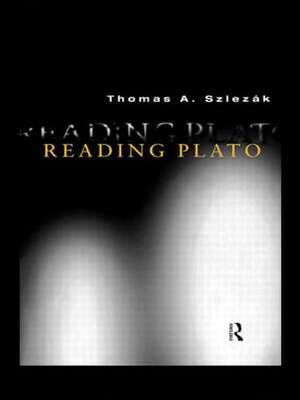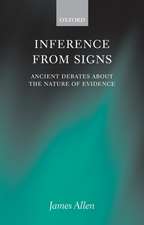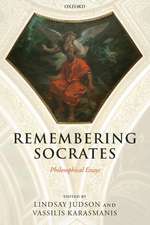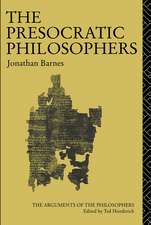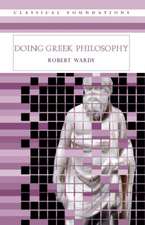Reading Plato
Autor Thomas A. Szlezák Traducere de Graham Zankeren Limba Engleză Paperback – 25 feb 1999
Taking as a starting point the critique of writing in the Phaedrus -- where Socrates argues that a book cannot choose its reader nor can it defend itself against misinterpretation -- Reading Plato offers solutions to the problems of interpreting the dialogues. In this ground-breaking book, Thomas A. Szlezak persuasively argues that the dialogues are designed to stimulate philosophical enquiry and to elevate philosophy to the realm of oral dialectic.
| Toate formatele și edițiile | Preț | Express |
|---|---|---|
| Paperback (1) | 349.10 lei 6-8 săpt. | |
| Taylor & Francis – 25 feb 1999 | 349.10 lei 6-8 săpt. | |
| Hardback (1) | 994.74 lei 6-8 săpt. | |
| Taylor & Francis – 4 mar 1999 | 994.74 lei 6-8 săpt. |
Preț: 349.10 lei
Nou
Puncte Express: 524
Preț estimativ în valută:
66.83€ • 68.77$ • 56.33£
66.83€ • 68.77$ • 56.33£
Carte tipărită la comandă
Livrare economică 01-15 martie
Preluare comenzi: 021 569.72.76
Specificații
ISBN-13: 9780415189842
ISBN-10: 0415189845
Pagini: 152
Dimensiuni: 138 x 216 x 13 mm
Greutate: 0.28 kg
Ediția:1
Editura: Taylor & Francis
Colecția Routledge
Locul publicării:Oxford, United Kingdom
ISBN-10: 0415189845
Pagini: 152
Dimensiuni: 138 x 216 x 13 mm
Greutate: 0.28 kg
Ediția:1
Editura: Taylor & Francis
Colecția Routledge
Locul publicării:Oxford, United Kingdom
Public țintă
Postgraduate and UndergraduateNotă biografică
Thomas A. Szlezák is Professor of Greek Philology at the University of Tubingen, Germany. He is the author of numerous books on Plato.
Recenzii
'An English translation of this splendid book is long overdue.' - Greece and Rome
Cuprins
Preface, 1. The Joys of Reading Plato, 2. The Reader participates, 3. An Example of Individual reception, 4. Possible Mistaken Opinions on the Part of the Reader, 5. One does not see what one does not know, 6. Characteristics of the Platonic Dialogues, 7. Questions about Characteristics, 8. For Whom is Plato Writing?, 9. Does a Platonic Dialogue Speak with Several Voices? The Modern Theory of the Dialogues, 10. An Ancient Theory of Interpretation, 11. The Interpretation of Simonides in the Protagoras, 12. The Critique of Writing in the Phaedrus, 13. The Definition of the Philosopher based on his Relationship to his Writings, 14. The Meaning of timiótera, 15. 'Support for Logos' in the Dialogues, 16. The Ascent to the Principles and the Limits of Philosophical Communication, 17. Some Gaps, 18. The Doctrine of Anamnesis and dialectic in the Euthydemus, 19. The Importance of the Allusions for Reading Plato, 20. Plato's Dramatic Technique: Some Examples, 21. Irony, 22. Myth, 23. Monologue and Dialogue with Imaginary Partners, 24. The Characteristics of the Dialogues: What they really mean, 25. How and why the Dialogue-Form has been misunderstood, 26. The Difference between Esotericism and Secrecy, 27. Plato's Concept of Philosophy and the Objectives of the Dialogues, Notes, Bibliography, Biographical Note.
Descriere
Reading Plato offers a concise and illuminating insight into the complexities and difficulties of the Platonic dialogues which will be invaluable to any student of Plato's philosophy.
